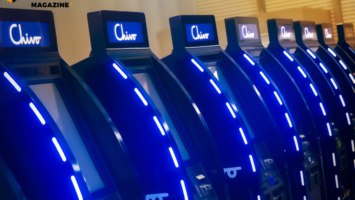
Enterprise blockchain started gaining traction in 2017 shortly after Bitcoin had reached its all-time high of nearly $20,000. Since then, enterprise blockchain has mainly been defined by private blockchain networks used by businesses for things such as supply chain management.
The enterprise blockchain space has changed quite a bit since 2017. For instance, 2020 has brought in a number of enterprise blockchain use cases that leverage public networks rather than private ones. The COVID-19 pandemic has also driven many companies, both large and small, to use blockchain for guaranteeing proof-of-health or to revive tourism. Finally, some blockchain companies this year have started showing an interest in decentralized finance, taking steps to drive this new sector.
Listed below are a total of 12 companies and solutions that have made strides in the enterprise blockchain space this year.
Ernst & Young
Big Four firm Ernst & Young has played an active role in enterprise adoption. The firm was one of the first to explore the cryptocurrency space in 2016 when the company conducted a survey to better understand the potential of digital assets. Since then, EY has been leading the way for public enterprise blockchain adoption.
For example, EY continues to contribute to the development of the Baseline Protocol, which uses the Ethereum public mainnet as a tamper-resistant state machine to record business data. In May 2019, EY open-sourced its Nightfall code for conducting private transactions on the Ethereum blockchain.
Moving forward, EY plans to make Nightfall and zero-knowledge proofs easier to use for developers. Paul Brody, blockchain lead at EY, previously told Cointelegraph that developers will eventually shift from building decentralized applications to creating zero-knowledge applications, or “ZApps,” with EY’s blockchain solutions.
IBM
Big Blue’s open-source blockchain for business platform is powered by Hyperledger Fabric, an important technology that has contributed to the growth of the IBM Blockchain platform. For example, the IBM Food Trust network is currently being leveraged by major food producers, such as Nestlé, Dole and olive oil giant CHO.
The Food Trust network dates back to 2016 — one of the earliest examples of enterprise blockchain when IBM blockchain was being leveraged by Walmart to determine food products that needed to be recalled. Another important project powered by IBM Blockchain is Maersk’s TradeLens platform, which helps shipping giants digitize their supply chains.
In addition, the Digital Health Pass platform uses IBM Blockchain to help provide verifiable health credentials, which has become extremely important due to the COVID-19 pandemic. IBM Blockchain’s partnership with the American software company Red Hat is also notable in terms of open-source development and a cloud strategy that heavily relies on blockchain technology.
Hedera Hashgraph
The decentralized public network Hedera Hashgraph was developed in 2016 with the goal of enabling developers to build secure applications with near real-time finality. Since then, Hedera’s network has grown to be owned and governed by an impressive list of companies, including Google, IBM and Boeing.
Hedera has recently demonstrated an important blockchain use case with the release of its “SAFE HealthCheck” app, which is being applied for remote COVID-19 testing. The app is currently being used at Arizona State University, where it provides over 70,000 students and staff members with remote testing and digital health status verification. The Hedera Consensus service, the company’s enterprise blockchain solution, is also being used for other important use cases including acting as an early-warning system for airstrikes in Syria.
IconLoop
South Korean blockchain company IconLoop was founded in 2016 to enable real-world blockchain applications within the banking, healthcare and government sectors. The company is headquartered in Seoul and has raised over $15 million in funding. IconLoop recently announced that Jeju Island, a tourism hot spot in South Korea, will use its Decentralized Identity blockchain to provide secure COVID-19 contact tracing.
It’s also notable that The Financial Services Commission recently approved IconLoop’s decentralized identity authentication service into the “Innovative Financial Services and Regulations Sandbox.” In October this year, Cointelegraph reported that IconLoop secured $8 million in a Series A funding round, which will be used to help launch a blockchain-based digital identity authentication service called my-ID.
World Economic Forum
The World Economic Forum Global Blockchain Council was developed to help advance blockchain technology for the global public interest. As such, the WEF council has launched a number of initiatives that leverage blockchain for public development. In May of this year, the council developed a list of blockchain principles to protect the rights of those in the blockchain community.
Understanding the risks and benefits of blockchain, and the right to store and manage cryptographic keys are included on the list. The blockchain council also recently launched a proof-of-concept to track greenhouse gas emissions from mining and metals companies across a blockchain network. It’s also notable that the WEF believes that blockchains can enable sustainable digital finance.
PayPal
PayPal, one of the largest online payments systems, has taken a keen interest in cryptocurrency and blockchain since 2014. It was during this time that the company announced it would enable merchants to accept Bitcoin (BTC) through Braintree via several partnerships. The company noted it was looking for a way “to understand how to leverage blockchain to better serve merchants and users.”
In 2016, PayPal’s administration became interested in developing its own blockchain to enable high-speed transactions using digital currencies. However, PayPal really shook up the crypto sector this year when the company announced plans for a new service to support cryptocurrency starting in early 2021. In November of this year, PayPal’s crypto trading and payment platform went live for U.S. users. PayPal’s recent entry into the cryptocurrency market is predicted to impact the price of Bitcoin moving forward.
Microsoft
Software giant Microsoft offers a blockchain-as-a-service through its cloud computing arm, Azure. While many companies such as GE Aviation and Starbucks leverage Microsoft’s blockchain platform for supply chain management, the company has taken a much larger role in blockchain development.
Most recently, Microsoft announced a partnership with EY to use the Ethereum blockchain for Xbox gaming royalties. In regards to the pandemic, the Albany Airport is trialing a “Wellness Trace App” to ensure cleanliness of surfaces inside the airport. The app is powered by the Microsoft Azure blockchain. In June of this year, Microsoft joined the InterWork Alliance to help create global standards for tokenized ecosystems.
Visa
Payment giant Visa has shown an interest in blockchain and cryptocurrency since 2015 when it made an investment in blockchain startup Chain. In October 2016, Visa announced a preview of “Visa B2B Connect” as a system powered by Chain to quickly and securely process business-to-business payments globally.
Visa’s early efforts in the blockchain space eventually flourished into groundbreaking developments in fintech. For instance, Visa now powers a number of crypto debit cards, like those from Binance and BlockFi. In December of this year, Visa joined forces with blockchain services company Circle to make USD Coin (USDC) stablecoin transactions compatible with certain credit cards.
However, Visa’s growing interest in fintech has also been met with scrutiny. In January, Visa acquired fintech firm Plaid, which was criticized by the U.S. Department of Justice, provoking a lawsuit against the payment provider.
JPMorgan
JPMorgan Chase is the biggest bank in the United States and one of the largest financial holdings in the world. The organization showed an interest in blockchain in 2017 when JPMorgan joined the Enterprise Ethereum Alliance, an association comprising companies interested in advancing the Ethereum blockchain.
In 2018, the banking giant published the “Bitcoin Bible” to explain to investors the positives and negatives of investing in crypto. In February 2019, JPMorgan announced its “JPM Coin” to help banks settle transactions quickly, which was subsequently launched in 2020. JPMorgan also leads the Interbank Information Network, a blockchain consortium consisting of over 130 banking partners that use distributed ledger technology to enhance compliance and reduce processing delays.
Related: JPM Coin debut marks start of blockchain’s value-driven adoption cycle
While JPMorgan is clearly pro-blockchain, the firm has taken a harsh stance toward Bitcoin over the year, yet this outlook seems to be changing as the price of Bitcoin continues to reach new all-time highs.
Baseline Protocol
Announced in March of this year, the Baseline Protocol initiative was launched as an Oasis open-source project to enable advanced interoperability for blockchain applications. Baseline Protocol started with 14 founding companies and has since grown to a community of over 700 members, with sponsor organizations, such as Accenture and ConsenSys supporting the project.
The Baseline Protocol is attempting to resolve the blockchain interoperability dilemma, which will ultimately bring more organizations onto the Ethereum blockchain. Currently, big companies, such as Coke One North America and SAP, are leveraging the Baseline Protocol to synchronize and share business data among multiple participants.
The Baseline Protocol, with help from enterprise blockchain company Provide offering “Baseline-as-a-Service,” will eventually pave the way for enterprise DeFi. This will allow businesses to move items of value, such as financial data included in invoices, across various networks.
Salesforce
Software giant Salesforce rolled out its first blockchain-based product in May 2019. Known as “Salesforce Blockchain,” this is a low-code blockchain platform that extends the power of Salesforce’s customer relationship management system, or CRM, which caters to over 150,000 customers.
Salesforce previously told Cointelegraph that its blockchain is meant to connect businesses with IT teams to drive ROI. The product is used by a number of companies, such a Automobili Lamborghini — the Italian automobile brand — to authenticate heritage Lamborghini cars.
In April of this year, Salesforce integrated Lition’s commercial blockchain technology to help the company leverage data decentralization in its CRM. Most recently, Salesforce partnered with IBM to bring IBM’s blockchain-based Digital Health Pass onto the Salesforce platform.
Fujitsu
Japanese IT company Fujitsu began showing interest in blockchain technology as early as 2016. In 2017, the IT giant announced that it was developing blockchain software powered by Hyperledger for data handling, access and distribution. Shortly after this, the company announced plans to commercialize its enterprise blockchain solution, making Fujitsu a direct competitor with IBM’s blockchain solution.
Most recently, Fujitsu has taken an interest in digital identity, leveraging its blockchain solution to detect a user’s identity and credentials for online transactions. It’s notable that Japan’s third-largest bank, Mizuho Bank, along with local payments giant JCB, plans to pilot a digital identity interoperability system powered by Fujitsu’s blockchain solution.



Comments (No)